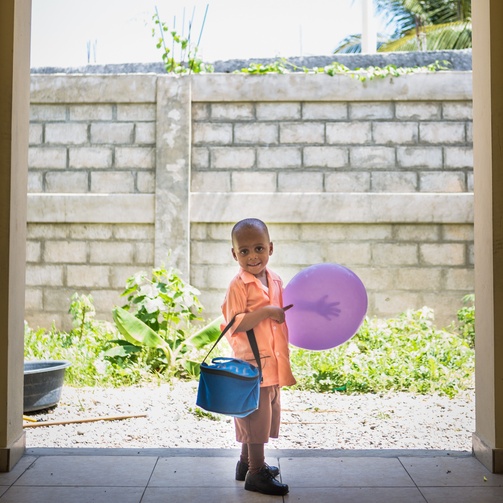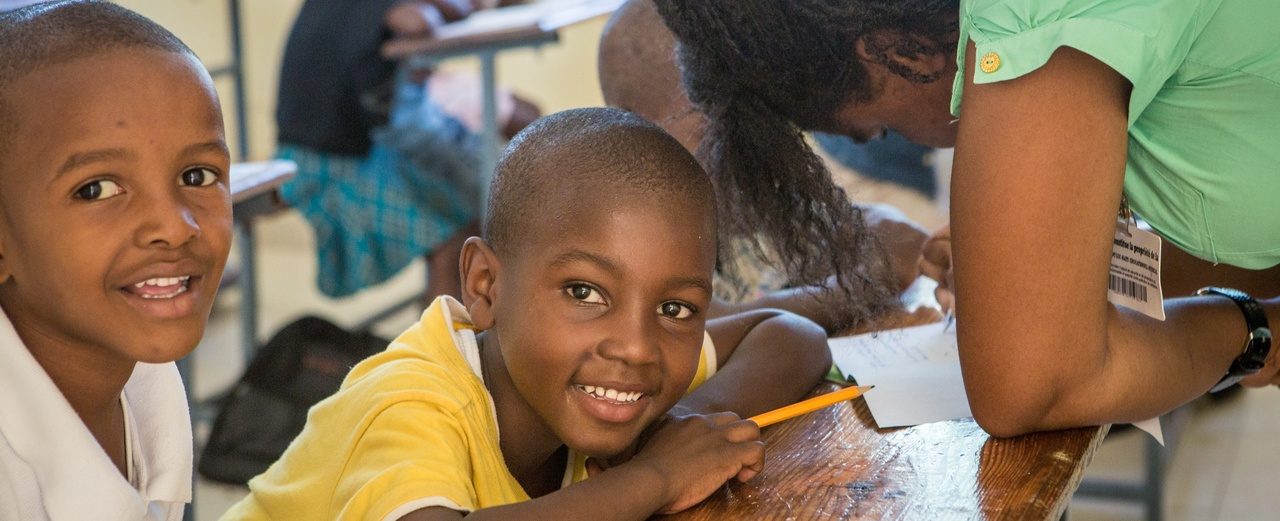 Healthy learning for a brighter future
Healthy learning for a brighter future
Primary health care for school children in Haiti
Lolo (11) and Nicolas (10) love their home country Haiti very much. At the same time, the schoolchildren know that there are problems where they live. Lolo also knows that Haiti is a developing country. She knows the word from her geography book. Lolo and Nicolas live in the Cité Soleil district in Port-au-Prince, the capital of Haiti. The risk of contracting tropical diseases such as typhoid fever or cholera is particularly high here. Families often do not have reliable access to clean drinking water. There is only an insufficient sewage system, so that diseases spread quickly. At school, many children are not vaccinated against the diseases that are highly infectious in this environment. Therefore, the risk of infection is quite high. For children like Lolo and Nicolas to realise their dreams, they need a healthy environment and basic medical care. Lolo later wants to become a tailor, and Nicolas a doctor. When he is older, he wants to help people who are ill.
Necessity
Primary health care for schoolchildren in Haiti.
Activity
The Haitian medical team diagnoses and treats the children’s illnesses and gives the mandatory vaccinations.
Countable effort
Number of days when primary health care can be provided to schoolchildren in Haiti.
Result
The children are vaccinated against the key diseases and their state of health is monitored.
Systemic effect
The state of health and simultaneously the educational prospects of children will have improved. This contributes to the long-term development of the country
Background
Together with around 600 other children, Lolo and Nicolas attend the free St. Emma and St. Nicolas primary schools in the poorest district of Port-au-Prince. More than three quarters of the residents here have to live on less than 2 euros per day. In addition to the poverty, health care is very poor throughout the country. The Haitian government spends an average of only 12 euros per person per year on the health of its citizens. In the neighbouring Dominican Republic this figure is 160 euros, and in Germany about 4,400 euros (World Bank Group, 2017). While there are 268 inhabitants per doctor in Germany, there are 3570 inhabitants in Haiti (World in Figures, 2019). Vaccination campaigns carried out by the state or international organisations reach only a small proportion of children. Since Haiti has only a small number of medical facilities, the costs are correspondingly high. Only a few families can afford vaccination there. Access to medical care is extremely difficult and many families are largely excluded from it. For Lolo, Nicolas and other children, this unfortunately also means that it is often difficult for them to attend school because they are too often absent due to acute illnesses. In addition, many children in Haiti still die of respiratory infections or diarrhoea, even though treating them would not be difficult.
The good deed
Through today's good deed, you portionally enable the more than 600 children in St. Emma and St. Nicolas to receive regular health care. A medical team visits the schools at least twice a year, examines the children and treats the sick, vaccinates the children against acute diseases and provides them with medication. In addition, there are information services for the parents of the children. For many of the children, this means that, for the first time in their lives, they receive a thorough medical examination and treatment. In addition, the team creates a patient file for each child, in which the history, examination results and treatments are recorded. In this way, the development can be monitored and serious illnesses can be detected earlier. The health of the children improves and with it also the chance for a good educational outcome and a better future.

AboutHaiti
Port-au-Prince
11,000,000
1,665
Placed 168 of 189
Haiti was the only country on Earth that gained its independence as a result of a slave revolt – as early as 1804. Natural disasters such as earthquakes and hurricanes repeatedly impact the country.
About the organization and further information
PEN PAPER PEACE e.V.
Website

Further information and source
- Deutsche Gesellschaft für Internationale Zusammenarbeit, 2019. Länderporträt Haiti.
- PEN PAPER PEACE, 2015. Nou Timoun Peyi Dhayiti.
- Ward, Alexis, 2017. Inside the Effort to Improve Emergency Care in Haiti.
- World Bank Group, 2017. Better Spending, Better Care. A Look at Haiti’s Health Financing.
- Young, Nancy, 2017. Haiti’s Troubled Healthcare System.
- Welt in Zahlen, 2019. Ärzte pro 1000 Einwohner, Ländervergleich.




